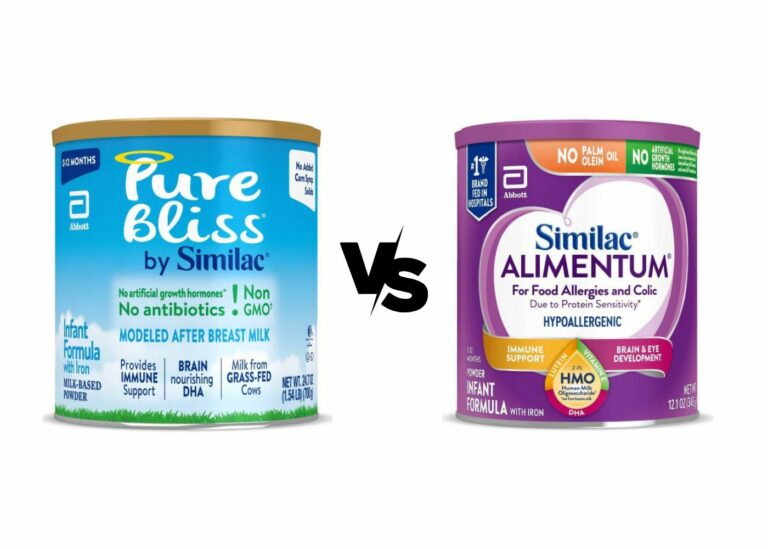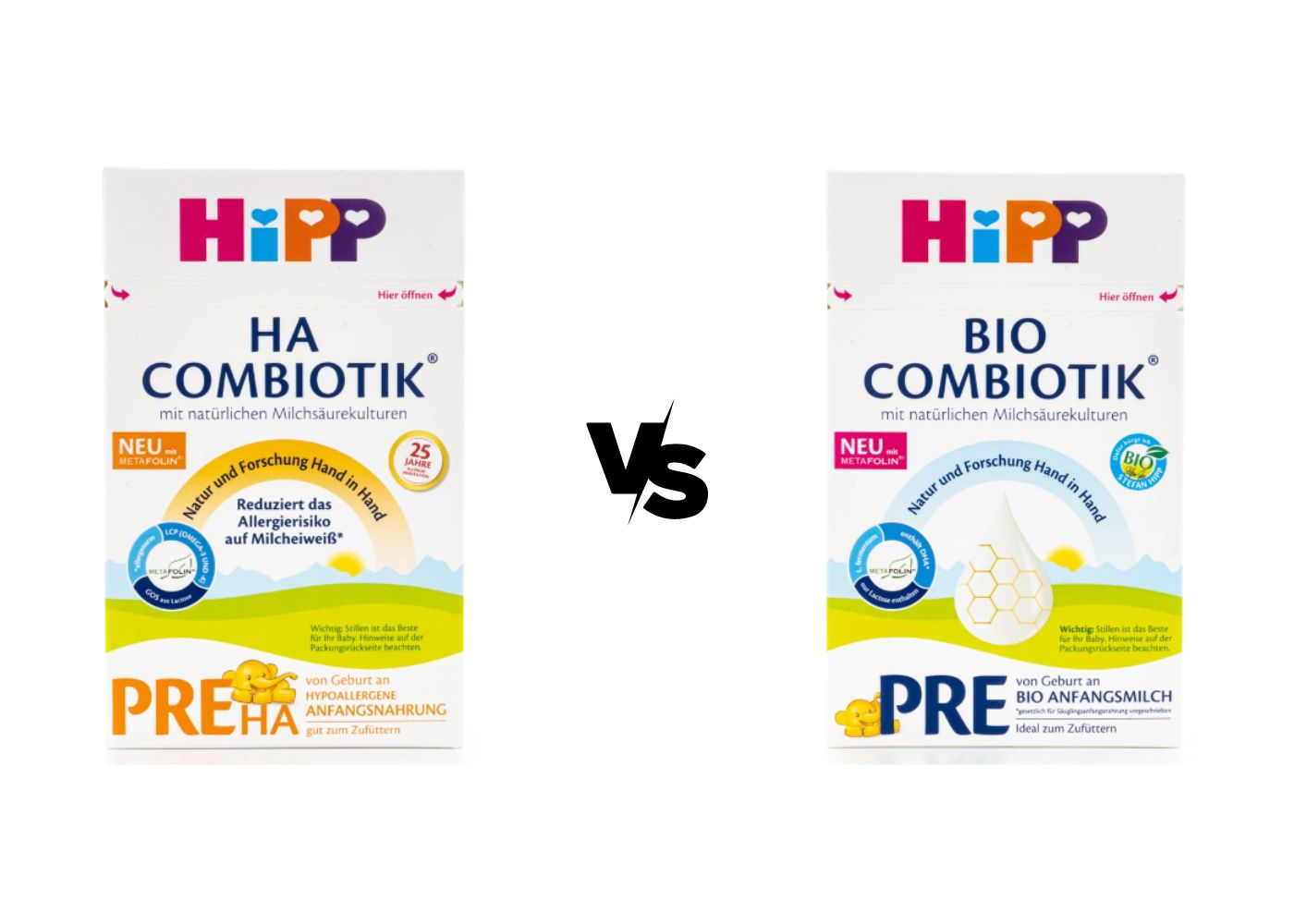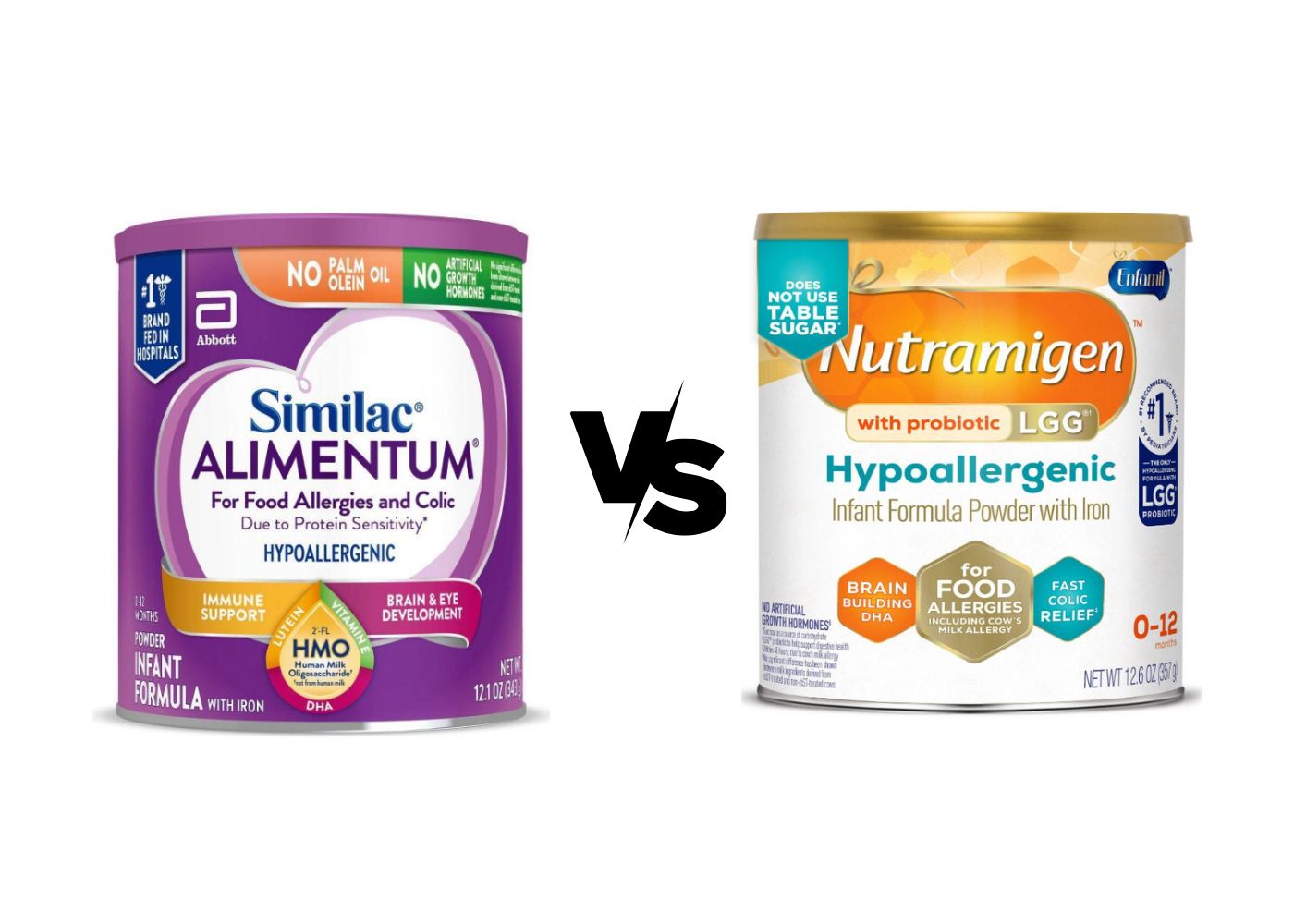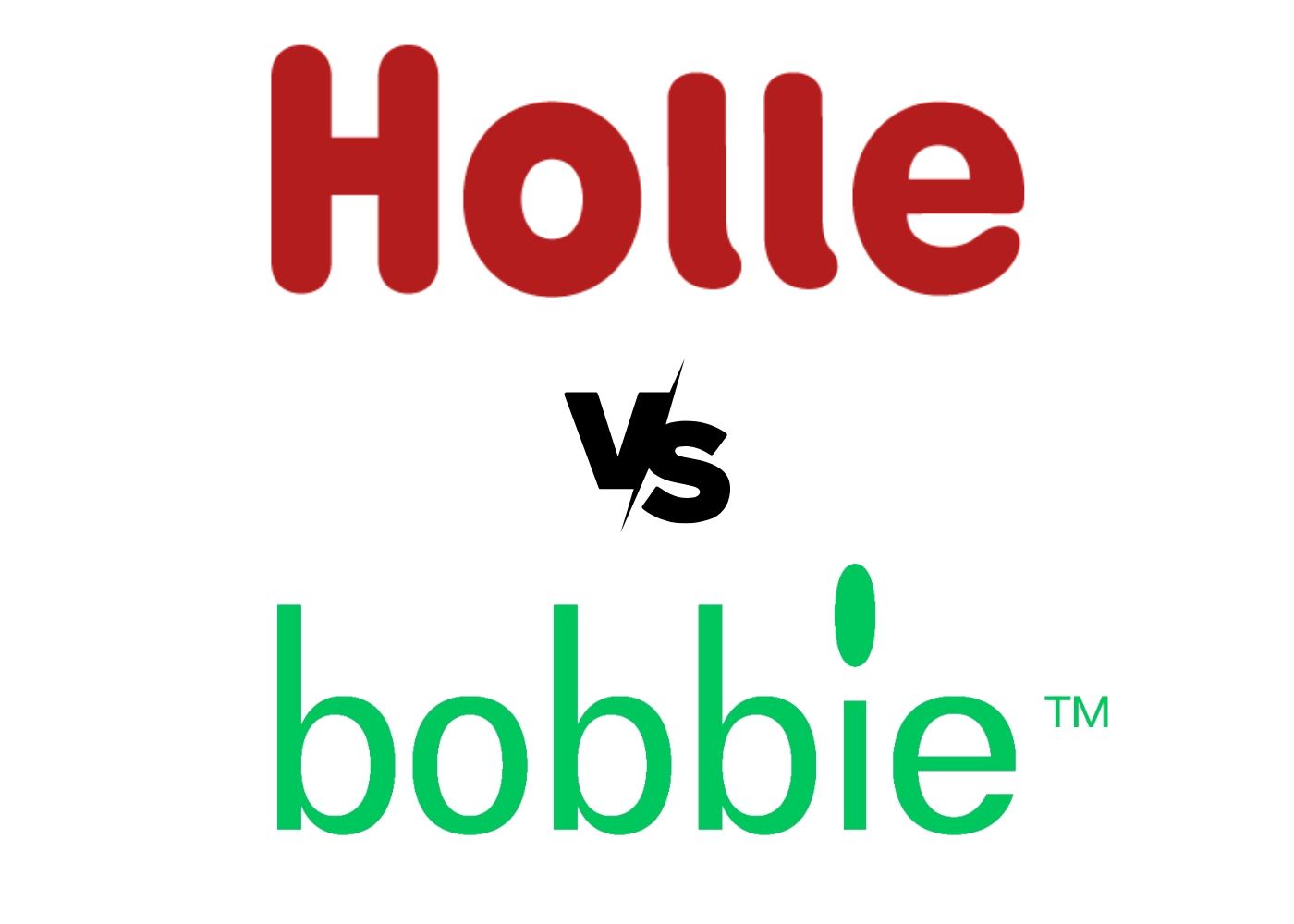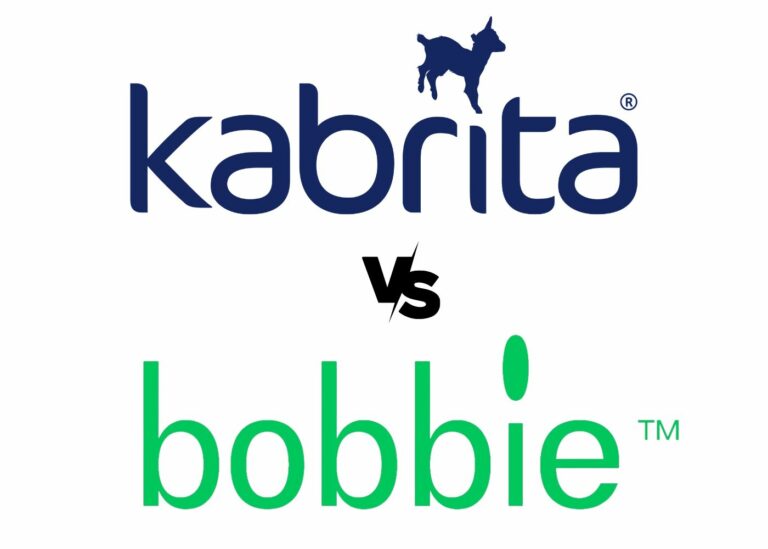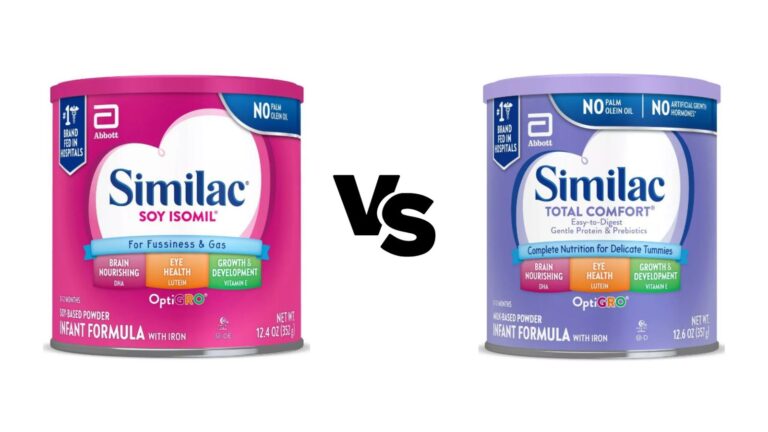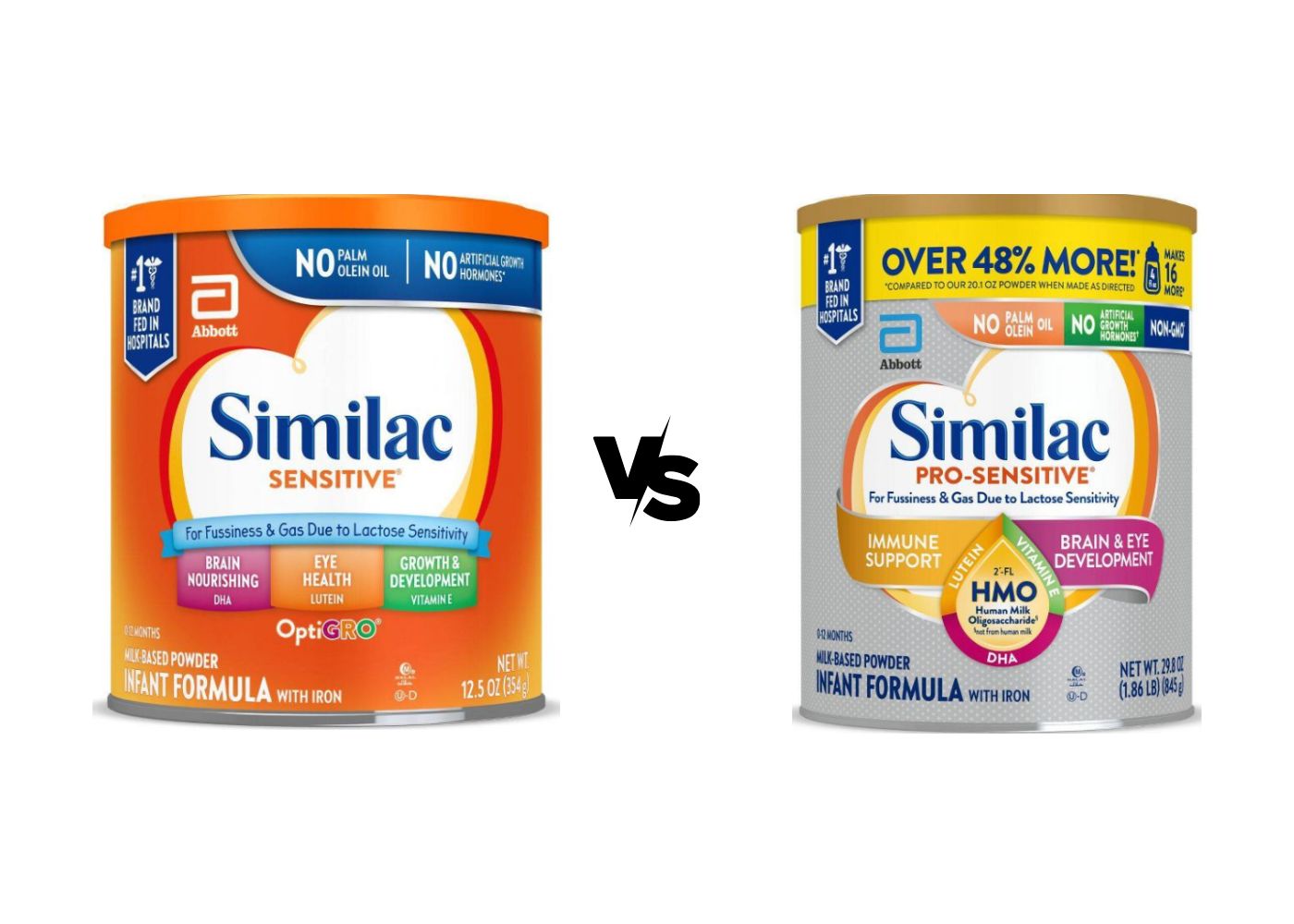
Key Differences Between Similac Sensitive and Pro-Sensitive
| Similac Sensitive | Similac Pro-Sensitive | |
|---|---|---|
| Protein Source | Milk Protein Isolate | Milk Protein Isolate |
| Carbohydrate Source | Corn Syrup Solids | Corn Syrup Solids |
| Fat Source | High Oleic Safflower Oil, Soy Oil, and Coconut Oil | High Oleic Safflower Oil, Soy Oil, and Coconut Oil |
| Additional Fatty Acids Source | C. Cohnii Oil (DHA), M. Alpina Oil (ARA) | C. Cohnii Oil (DHA), M. Alpina Oil (ARA) |
| Prebiotics | Short-Chain Fructooligosaccharides | Short-Chain Fructooligosaccharides, 2′-FL HMO |
| Probiotics | None | None |
| Genetically Engineered Ingredients | No | No |
| Palm Olein Oil | No | No |
| Aimed At | Babies with sensitive tummies | Babies with sensitive tummies |
| Price | $ | $$ |
This post is aimed at parents trying to decide between Similac Sensitive and Similac Pro-Sensitive.
We will analyze both formulas’ ingredients and nutritional composition to give you the information you need to make an informed decision.
Let’s get after it!
*Related: Enfamil Gentlease vs Similac Pro Sensitive
Our Short Answer
The comparison of these twin formulas is quite easy: Similac Pro-Sensitive is technically a better formula than Sensitive.
Both are nutritionally the same: same ingredients and virtually the same macro and micronutrients.
Their only difference lies in one ingredient: 2′-Fucosyllactose (2-FL HMO).
This prebiotic is an HMO (Human Milk Oligosaccharides), a complex carbohydrate found naturally in breast milk with many benefits for babies, including:
- Bacterial prevention in baby’s microbiota.
- Immune system support.
- Brain development.
2-FL HMO is present in all “Pro” versions of Similac, being the only difference with its standard versions.
Overview of the Two Formulas
Similac Sensitive is for babies with lactose sensitivity, easing gas and fussiness, with DHA and ARA for brain and eye growth. Similac Pro-Sensitive adds 2′-Fucosyllactose, a breast milk prebiotic, boosting immunity. Both have no artificial growth hormones.
Similac Sensitive
Similac Sensitive is an infant formula specifically designed for babies with sensitive stomachs. Its primary ingredients include Corn Syrup, Milk Protein Isolate, High Oleic Safflower Oil, Sugar, Soy Oil, and Coconut Oil. This blend is designed to ease fussiness and gas due to lactose sensitivity.
The formula includes essential nutrients like DHA derived from C. Cohnii Oil and ARA sourced from M. Alpina Oil for brain and eye development. It does not contain artificial growth hormones.
Similac Sensitive’s target audience is infants who experience mild spit-up or gas due to lactose sensitivity. However, it’s not recommended for infants or children with galactosemia.
Similac Pro-Sensitive
Similac Pro-Sensitive is one step up in Similac’s line of baby formulas formulated for sensitive tummies. It incorporates the same base ingredient blend as its counterpart but brings an extra advantage: it includes 2′-Fucosyllactose (2-FL HMO), an immune-nourishing prebiotic previously only found in significant levels in breast milk.
This introduction of 2′-FL HMO supports immunity throughout the whole body by simulating a key component found in breast milk–making Pro-Sensitive as close as possible to natural feeding while remaining gentle on your baby’s tummy.
Like the Sensitive variant, Pro-Sensitive contains no artificial growth hormones and boosts brain and eye development. It’s designed for babies aged 0 to 12 months who require complete nutrition support in their first year.
Nutritional Composition
Both Similac Sensitive and Pro-Sensitive use milk protein isolate for better baby tolerance and corn syrup for easy-to-digest energy. Their fats include high oleic safflower, soy, and coconut oils, plus algae-derived Omega 3 & 6, promoting eye and immune health. No palm oil included.
Protein Content
Milk protein isolate is the primary protein source for both of these formulas. Protein is essential to help build and repair tissues.
These formulas are intended for infants who might have an intolerance to extensive milk proteins hence the use of protein isolate displaying a generally better tolerance among babies with sensitive stomachs.
Milk protein isolate is a concentrated protein source without lactose, leaving primarily the proteins intact. It contains whey and casein protein.
Carbohydrate Content
Corn Syrup is the primary carbohydrate source for both Similac Sensitive and Pro-Sensitive, which typically is easy-to-digest sugar offering quick energy release.
Corn Syrup is the most used alternative to lactose for special formulas in the US; however, it is not the best for its high simple sugar content. There are other starches, milder in flavor and with less amount of simple sugars. *Learn more: Corn Syrup in Baby Formula | Starch in Baby Formula
Fats and Oils
Both Similac Sensitive and Pro-Sensitive contain high oleic safflower oil, high in monounsaturated “good” fat known to support heart health. Soy oil offers polyunsaturated fats, whereas coconut oil provides saturated fats that serve as concentrated energy sources. The remaining two oils are derived from algae (C.Cohnii & M.Alpina), offering crucial Omega 3 & 6 fatty acids, including DHA (docosahexaenoic acid), promoting eye development with ARA (arachidonic acid) supporting skin health and immunity.
The fact that there are no traces of palm oil or palm olein, and that coconut oil is included, makes the fat blend of these two formulas better than many other US-based formulas.
Learn more: Vegetable Oils in Formula | Palm Oil in Formula | DHA and ARA in Formula
Probiotics and Prebiotics
Similac Pro-Sensitive wins the prebiotic battle by adding 2’-Fucosyllactose (2’-FL), a type of HMO found in breast milk and highly beneficial for babies’ microbiota.
No probiotics in either formula.
Probiotics and prebiotics are crucial in maintaining a healthy gut flora, aiding digestion, and boosting the immune system.
While Similac Sensitive offers Short-Chain Fructooligosaccharides, a prebiotic, Similac Pro-Sensitive goes further.
It contains Short-Chain Fructooligosaccharides and 2’-Fucosyllactose (2’-FL), a prebiotic found in breast milk. This prebiotic is known to help strengthen the baby’s developing immune system, supporting overall health and growth.
Best Places to Buy Similac Sensitive and Pro-Sensitive


Similac Sensitive
Buy Similac Sensitive at Target
Buy Similac Sensitive at Walmart
Similac Pro-Sensitive
Buy Similac Pro-Sensitive at Walmart
What are the best alternatives to Similac Sensitive and Pro-Sensitive?
While Similac Sensitive and Pro-Sensitive offer commendable options for babies with sensitive tummies, we have other recommendations that we would go for before trying Similac.
Here are our favorite alternatives to Similac Sensitive and Pro-Sensitive:
Enfamil Neuropro Gentlease emerges as a standout alternative when compared with Similac counterparts. This formula is enriched with MFGM (Milk Fat Globule Membrane), a compound evolved from researching brain-building benefits in breast milk. Further, Neuropro Gentlease is lactose-free, making it highly digestible for tiny tummies prone to gas or fussiness due to lactose overload. *Read: Enfamil Neuropro Gentlease vs Similac Sensitive
Bobbie Gentle Formula may strike a chord if you want to nourish your baby organically. It boasts of superior European ingredient standards, keeping GMOs at bay while prioritizing organic ingredients—making Bobbie Gentle an attractive choice if you’re environmentally conscious too. *Related: Bobbie vs Similac
Last, Hipp Comfort impresses with its organic ingredients and potent prebiotic and probiotic blend that closely mimics breast milk. It’s designed for sensitive tummies by being gentle on digestion while boosting gut health. Hipp Comfort also ensures a gluten-free profile—another plus point for parents preferring hypoallergenic feeding options. *Related: Hipp vs Similac
Hipp HA is the top hypoallergenic formula among our favorite options, thanks to its high-quality, organic, and natural ingredients. Carefully processed to break down milk proteins, Hipp HA is less likely to trigger an allergic response, making it an excellent option for sensitive babies. *Read: Best Hypoallergenic Formulas
If your baby has digestive trouble related to cow’s milk protein but doesn’t have Cow’s Milk Protein Allergy (CMPA), goat milk formulas like Kabrita and Kendamil Goat can be stellar choices. Easier to digest and less likely to cause allergic reactions than cow’s milk, goat-milk-based formulas can offer a smoother tummy experience for your baby, while still ensuring all the needed nutrients for their growth and development. *Read: Kendamil vs Kabrita
Conclusion
We hope this comparison between Similac Sensitive and Similac Pro-Sensitive has helped you choose the best formula for your baby.
If you have further questions, remember to comment down below.
Happy feeding!
We’re Maria and Alberto, a married couple and educators who are nutrition enthusiasts. Even before we had kids, we were already crazy about nutrition.
We’d read scientific articles, watch videos from nutritionists, and spend hours listening to nutrition podcasts.
Today, we continue doing this, but in a different way, as we’ve learned to sift through the noise and trends. Nutrition, like any other field of knowledge, the more you read and learn, the more you develop a comprehensive understanding of reality, and that’s what has happened to us.
Before having our first child, we focused on learning everything we could about child nutrition, using the same techniques we had already employed, backed by our extensive knowledge in nutrition.
Our mission is to help other parents with their children’s nutrition, to help them become the best versions of themselves.
If we are what we eat and drink, which is absolutely true, let’s do it right!


